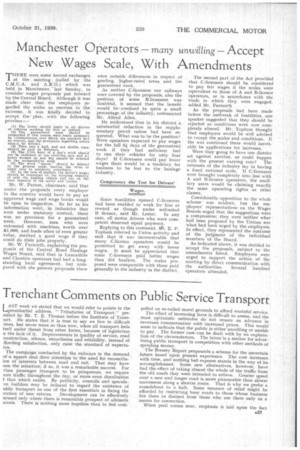Manchester Operators — many unwilling — Accept
Page 29

If you've noticed an error in this article please click here to report it so we can fix it.
New Wages Scale, With Amendments
THERE were some heated exchanges at the . meeting (called by the C.M.U.A. and A.R.0.) which was held in Manchester,last Sunday, to consider wages proposals put forward by the Central Board. Although it was made clear that the employers regarded the scales as onerous in the extreme, it was finally decided to accept the: plan; with the following provisos : 11) The Order should apply to all drivers of vehicles working for hire or reward.
12) The guaranteed week should be suspended if this course were made necessary by circumstances over which the operator had no control, and the provisions regarding notice should be deleted.
(3) Time and a half, and not double time. should be raid on Sundays. (4) The 11th hour of a day s molt shou:d not be reckoned at the overtime rate and all hours worked on any day should be counted in the accumulative week.
(5) The word "mates " shon:d be deleted in the general scale, leaving the rates to apply only to statutory attendants. (6) In the case of trailers, the driver's wages should be computed on the carrying capacity of only the hauling vehicle and not on the total capacity oi the motor and trailer,
Mr. W. Pattoe, chairman, said that under the proposals every employer in the country would have to pay an approved wage and wage books would be open to inspection. So far as his information went, in industries that were under statutory control, there was no provision for a guaranteed week. However, men who were entrusted with machines, worth over £1,000, and loads often of even greater value, merited a good wage if they could do their jobs properly.
Mr. VV. Farnorth, explaining the proposals of the Central Road Haulage Wages Board, said that in Lancashire and Cheshire operators had had a longstanding local agreement, but cdmpared with the present proposals there were notable differences in respect of grading, higher-rated areas and the guaranteed week.
As neither C-licensees nor railways were covered by the proposals, also the position of some B-licensees was doubtful, it seemed that the benefit .would beconfined to quite a small percentage of the inthistry, commented Mr. Alfred Allen,
He understood that in his district a substantial reduction in the supplementary petrol ration had been requested. What was to be the position? Were operators expected to pay wages for the full 5i days of the guaranteed. week if they had sufficient fuel to run their vehicles for only four days? If C-licensees could pay lower wages there would be a tendency for business to be lost to the haulage industry.
Competency the Test for Drivers' Wages.
Since hostilities opened C-licensees had been enabled to work for hire or reward as though under unlimited B licence, said Mr. Lester. In any case, all motor drivers who were competent deserved equal payment. Replying to this comment, Mi. E. F. Topham referred to Union activity and said that it was inconceivable that many C-licence operators would be permitted to get away with lower wages. It must be appreciated that some C-licensees paid better wages than did hauliers. The scales proposed were comparable with those paid generally in the industry in the district. The second part of the Act provided that C-licensees should be considered to pay fair wages if the scales were equivalent to those of A and B-licence operators, or in accordance with the trade in which they were engaged, added Mr. Farnorth As the proposals had been made before the outbreak of hostilities, one speaker suggested that they should be rejected as conditions were now completely altered. Mr. Topham thought that employers would be well advised to r ccept the scales' and conditions. It the war continued there Would inevitably be applications for increases.
Were they going to have One district set against another, as could happen with the present varying rate? The interests of the industry lay in having a fixed national scale. If C-licensees were brought completely into line with A and B-licence operators, the ancillary users would be claiming exactly the same operating rights, as other classes.
Considerable opposition to the whole scheme was evident, but the employers' representatives on the Wages Boards urged that the suggestions were a compromise; they were neither what had been proposed by the Unions nor what had been urged by the employers. In effect, they represented the outcome of the judgment of the individual members of the Board.
As indicated above, it was decided to accept the proposals, subject to the amendments listed, Employers were urged to support the action of the meeting by direct communication with the authorities. Several hundred operators attended.




















































